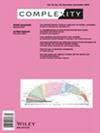Corrigendum to “Funnel-Based Adaptive Neural Fault-Tolerant Control for Nonlinear Systems with Dead-Zone and Actuator Faults: Application to Rigid Robot Manipulator and Inverted Pendulum Systems”
IF 1.7
4区 工程技术
Q2 MATHEMATICS, INTERDISCIPLINARY APPLICATIONS
引用次数: 0
Abstract
In the article titled “Funnel-Based Adaptive Neural Fault-Tolerant Control for Nonlinear Systems with Dead-Zone and Actuator Faults: Application to Rigid Robot Manipulator and Inverted Pendulum Systems” [1], an Acknowledgments section was omitted in error. The Acknowledgments section is shown below:
带有死区和执行器故障的非线性系统的基于漏斗的自适应神经容错控制:在刚性机械臂和倒立摆系统中的应用
在题为“基于漏斗的非线性死区和执行器故障系统的自适应神经容错控制:在刚性机械臂和倒立摆系统中的应用”的文章中,由于错误而省略了致谢部分。致谢部分如下所示:
本文章由计算机程序翻译,如有差异,请以英文原文为准。
求助全文
约1分钟内获得全文
求助全文
来源期刊

Complexity
综合性期刊-数学跨学科应用
CiteScore
5.80
自引率
4.30%
发文量
595
审稿时长
>12 weeks
期刊介绍:
Complexity is a cross-disciplinary journal focusing on the rapidly expanding science of complex adaptive systems. The purpose of the journal is to advance the science of complexity. Articles may deal with such methodological themes as chaos, genetic algorithms, cellular automata, neural networks, and evolutionary game theory. Papers treating applications in any area of natural science or human endeavor are welcome, and especially encouraged are papers integrating conceptual themes and applications that cross traditional disciplinary boundaries. Complexity is not meant to serve as a forum for speculation and vague analogies between words like “chaos,” “self-organization,” and “emergence” that are often used in completely different ways in science and in daily life.
 求助内容:
求助内容: 应助结果提醒方式:
应助结果提醒方式:


